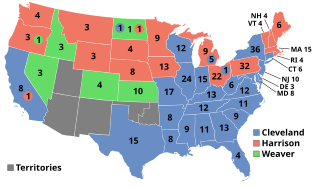
The 1892 United States presidential election was the 27th quadrennial presidential election, held on Tuesday, November 8, 1892. In the fourth rematch in American history, former Democratic President Grover Cleveland defeated incumbent Republican President Benjamin Harrison. Cleveland's victory made him the first and, to date, the only person in American history to be elected to a non-consecutive second presidential term. It was also the first of two times incumbents were defeated in consecutive elections—the second being Jimmy Carter's defeat of Gerald Ford in 1976, followed by Carter's subsequent loss to Ronald Reagan in 1980.

The 1896 United States presidential election was the 28th quadrennial presidential election, held on Tuesday, November 3, 1896. Former Governor William McKinley, the Republican nominee, defeated former Representative William Jennings Bryan, the Democratic nominee. The 1896 campaign, which took place during an economic depression known as the Panic of 1893, was a political realignment that ended the old Third Party System and began the Fourth Party System.

The 1908 United States presidential election was the 31st quadrennial presidential election, held on Tuesday, November 3, 1908. Republican Party nominee William Howard Taft defeated three-time Democratic nominee William Jennings Bryan.

The 1928 United States presidential election was the 36th quadrennial presidential election, held on Tuesday, November 6, 1928. Republican former Secretary of Commerce Herbert Hoover defeated the Democratic nominee, Governor Al Smith of New York. After President Calvin Coolidge declined to seek reelection, Hoover emerged as his party's frontrunner. As Hoover's party opponents failed to unite around a candidate, Hoover received a large majority of the vote at the 1928 Republican National Convention. The strong state of the economy discouraged some Democrats from running, and Smith was nominated on the first ballot of the 1928 Democratic National Convention. Hoover and Smith had been widely known as potential presidential candidates long before the 1928 campaign, and both were generally regarded as outstanding leaders. Both were newcomers to the presidential race and presented in their person and record an appeal of unknown potency to the electorate. Both faced serious discontent within their respective parties' membership, and both lacked the wholehearted support of their parties' organization.

The Prohibition Party is a political party in the United States known for its historic opposition to the sale or consumption of alcoholic beverages and as an integral part of the temperance movement. It is the oldest existing third party in the United States and the third-longest active party.

Silas Comfort Swallow was a United States Methodist preacher and prohibitionist politician who was a lifelong opponent of slavery. He was the Prohibionist presidential nominee in 1904.

Arthur Sewall was an American shipbuilder from Maine, best known as the Democratic nominee for Vice President of the United States in 1896, running mate to William Jennings Bryan. From 1888 to 1896, he served as a member of the Democratic National Committee and unsuccessfully ran for Maine's Senate seat against Eugene Hale. The only elective offices Sewall held were as councilman and alderman in the town of Bath, Maine.
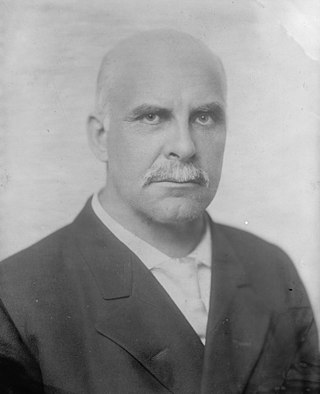
Eugene Wilder Chafin was an American politician and writer who served as the Prohibition Party's presidential candidate during the 1908 and 1912 presidential elections. He was active in local politics in Wisconsin, statewide elections in Wisconsin, Illinois, and Arizona, and campaigned throughout the United States and the world in favor of the prohibition of alcohol.
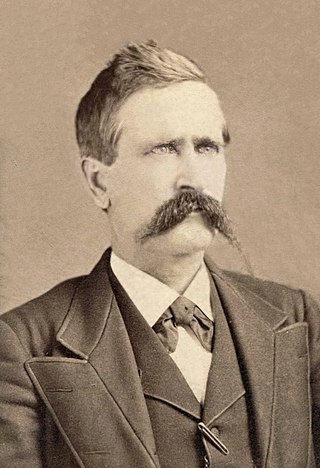
John Pierce St. John was an American politician who served as the eighth Governor of Kansas and later served as the Prohibition presidential nominee in 1884. Under his tenure as governor Kansas became the third state to enact a statewide prohibition of alcohol which would last until 1948 and remain in some form until 1987. After leaving elected office he maintained his position in the Prohibition party and remained active in the party's presidential politics and was a major figure in the party schism during the 1896 presidential election.

James Black was an American temperance movement activist and a founder of the Prohibition Party. Black served as the first presidential nominee of the Prohibition Party during the 1872 presidential election.

Gideon Tabor Stewart was an American lawyer and politician who served as the Prohibition Party's vice presidential nominee in 1876. He was elected three times as grand worthy chief templar of the Good Templars of Ohio.

William Daniel was an American politician from the state of Maryland. A lawyer, he was a noted prohibitionist and abolitionist. He served in both houses of the Maryland state legislature, first as a Whig, and later as a member of the American Party. Later, as a Republican, he was a member of the convention that wrote Maryland's constitution in 1864. He helped found the Maryland Temperance Alliance in 1872 and served as its president for twelve years. Daniel was the vice presidential nominee and running mate of John St. John on the Prohibition Party ticket in the presidential election of 1884. Placing third in the election that year, he continued his involvement with the cause of temperance until his death in 1897.

Hale Johnson was an American attorney and politician who served as the Prohibition Party's vice presidential nominee in 1896 and ran for its presidential nomination in 1900.

Marie Caroline Brehm was an American prohibitionist, suffragist, and politician. The Head of the suffrage department for the Woman's Christian Temperance Union (WCTU), she was a key figure in the Prohibition Party and Presbyterian Church, active in both local and national politics, and an advocate of reform laws. Twice she was appointed by the President to represent the United States at the World's Anti-Alcoholic Congress in Europe. Additionally, she was the first woman to run for the Vice President of the United States after the 19th amendment granted women the right to vote.

Charles Eugene Bentley was an American politician who served as the presidential nominee of the National Party, an offshoot party created by the broad gaugers faction of the Prohibition Party, during the 1896 presidential election.
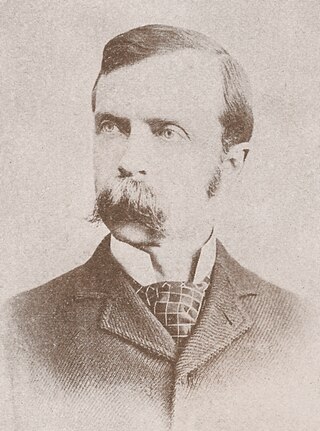
John Granville Woolley was an American politician, lawyer, and public speaker who served as the Prohibition Party's presidential candidate in 1900.

James Britton Cranfill was an American religious figure and prohibitionist who served as the Prohibition Party's vice presidential nominee in 1892.
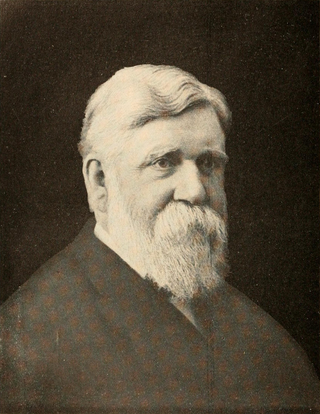
Henry Brewer Metcalf was an American prohibitionist and politician from Rhode Island, who served as the Prohibition Party's gubernatorial candidate thrice and vice presidential nominee in 1900.

The 1880 Prohibition National Convention was a presidential nominating convention held at Halle's Hall, in Cleveland, Ohio on June 17, 1880, to select the Prohibition Party's presidential ticket for the 1880 presidential election.

The 1884 Prohibition National Convention was a presidential nominating convention held at Lafayette Hall, in Pittsburgh, Pennsylvania from July 23–24, 1884, to select the Prohibition Party's presidential ticket for the 1884 presidential election.




















